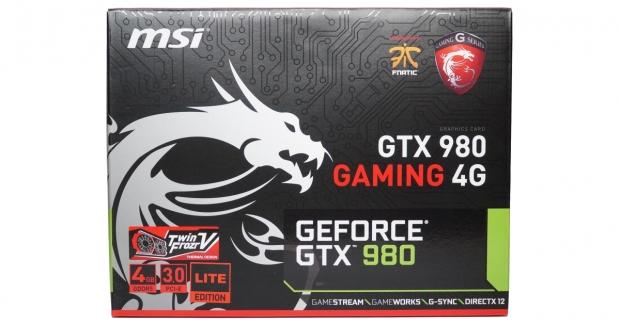
The Bottom Line
Introduction, Quick Specs and Availability & Price
MSI has a few GeForce GTX 980s in its ever-growing arsenal of Maxwell-powered video card products, with the quietly announced GeForce GTX 980 Gaming 4G LE. LE standing for Lite Edition, which reduces the overclock on the GM204 core slightly against its more behemoth bigger brother, the Gaming 4G.
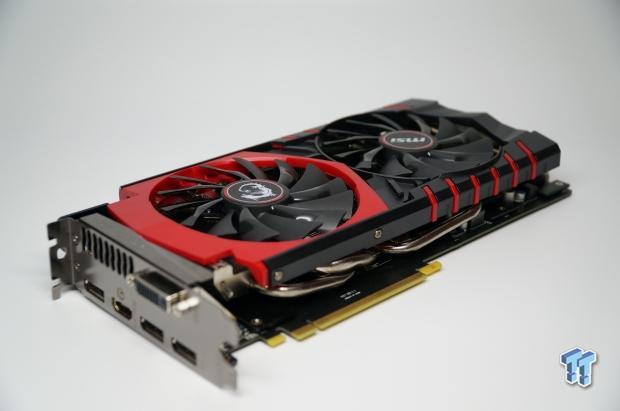
The company has donned this card with the kick-ass Twin Frozr V cooler that we fell in love with on the MSI GeForce GTX 960 Gaming 2G, but this time we have it on the much faster GTX 980. The company has stuck to the reference design in terms of display outputs, and has some nifty tricks with its fan and software to keep the card running cool, but also quiet.
MSI has been a fan favorite to gamers for a number of years now with some bleeding edge products, especially with its more than impressive Twin Frozr cooling technology. Mix this with the NVIDIA GeForce GTX 980 graphics core and some overclocking and we are most likely in for a winner here.
Quick Specs
MSI has decreased the overclock on the GTX 980 core with its GTX 980 Gaming 4G LE when compared against the normal GTX 980 Gaming 4G. We'll get into that in the next few pages, but for now we have 4GB of GDDR5 at its stock 7GHz frequency, the aforementioned Twin Frozr V cooler, 4-way SLI support, DirectX 12 support, and more.
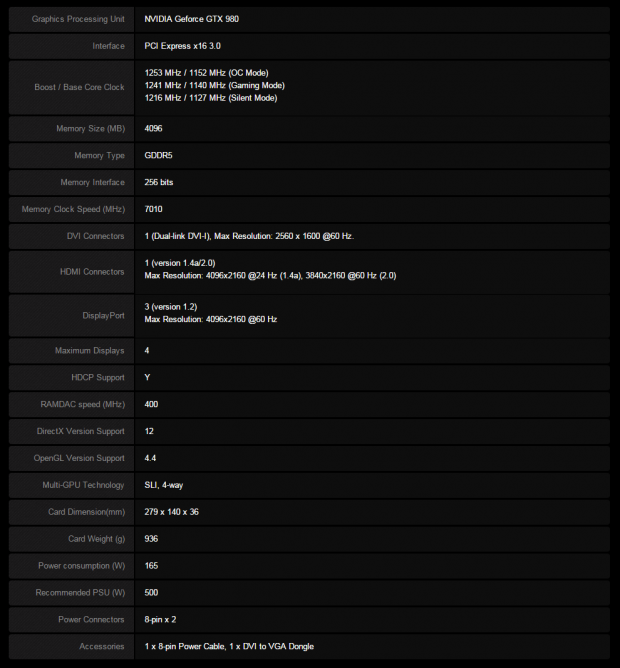
Above, we have the full list of specifications for the MSI GeForce GTX 980 Gaming 4G LE.
Availability & Price
Amazon doesn't list the MSI GeForce GTX 980 Gaming 4G LE, but it does list the normal GTX 980 Gaming 4G for $559.99, while Newegg sells the GTX 980 Gaming 4G LE for the same price: $559.99. At the time of writing, Newegg was displaying "out of stock" on the card.
Packaging and Detailed Look
The Packaging
MSI has such a great box with its VGA cards right now, with some awesome dragon artwork splashed on the front of a red and black theme.
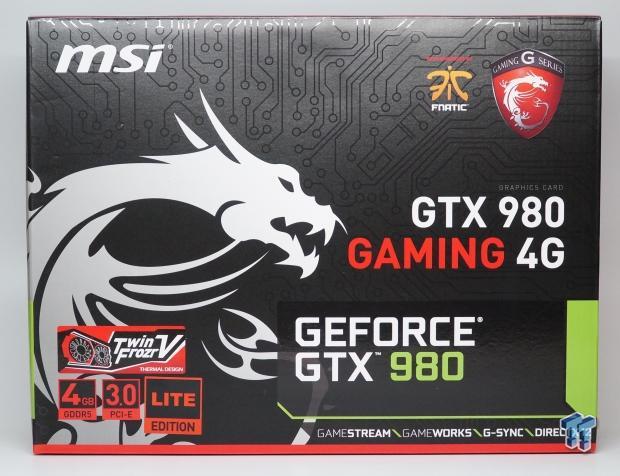
Starting with the front of the box, we have the aforementioned dragon on the front of the box. Up the top, we see that MSI is partnered up with eSports with Fnatic recommending MSI products. Up in the top right, we see this card is part of MSI's Gaming Series of products.
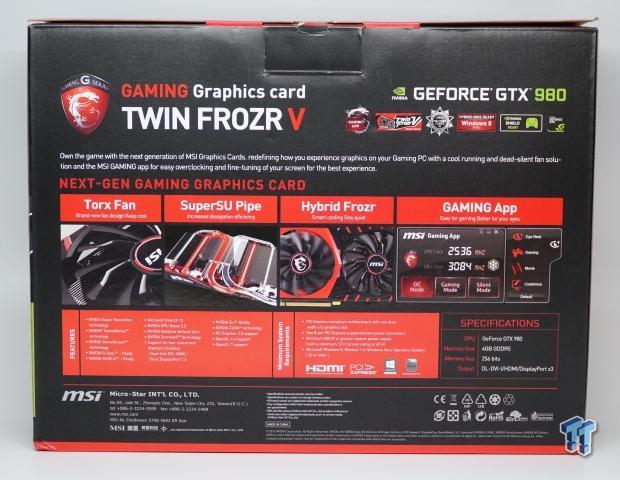
On the back, we have a full rundown of what to expect with the MSI GTX 980 Gaming 4G LE.
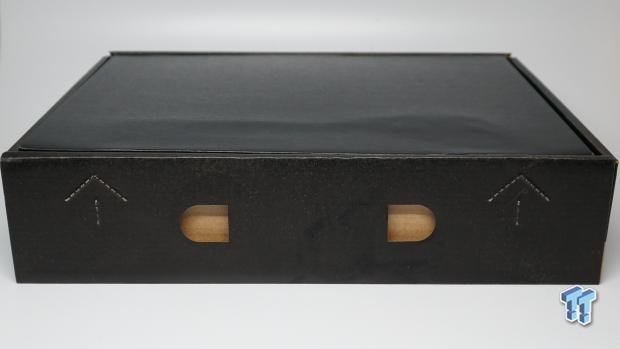
The card comes in another box with some great padding to protect it.
Detailed Look
The MSI GeForce GTX 980 Gaming 4G LE is one of the better-looking GTX 980s on the market, especially with its sexy yet great performing Twin Frozr V cooler.
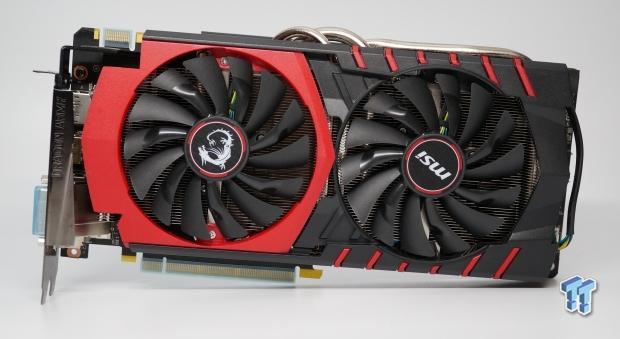
Looking directly at the front of the GTX 980 Gaming 4G LE, we see the Twin Frozr V cooler and its red and black theme.
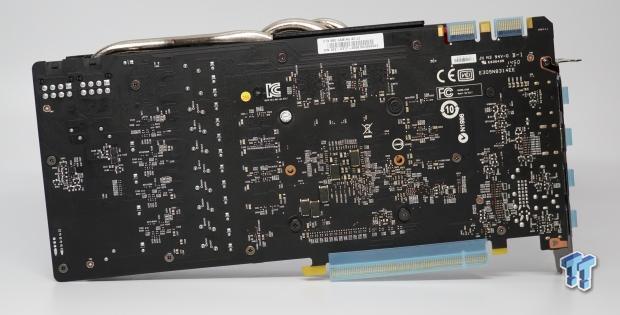
There's not much happening on the back, but we do see that MSI opted out of using the backplate that NVIDIA uses on the reference GTX 980.
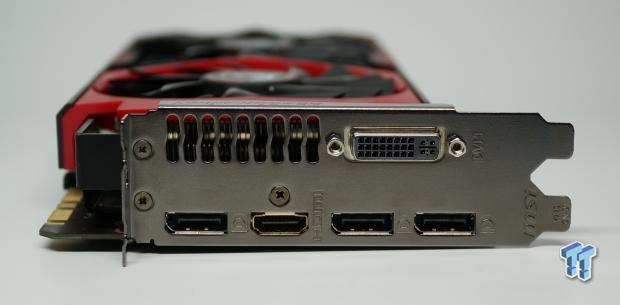
MSI has stuck with the display output configuration of NVIDIA's reference design, with three DisplayPort 1.2 outputs, one dual-link DVI and one HDMI 2.0 output.
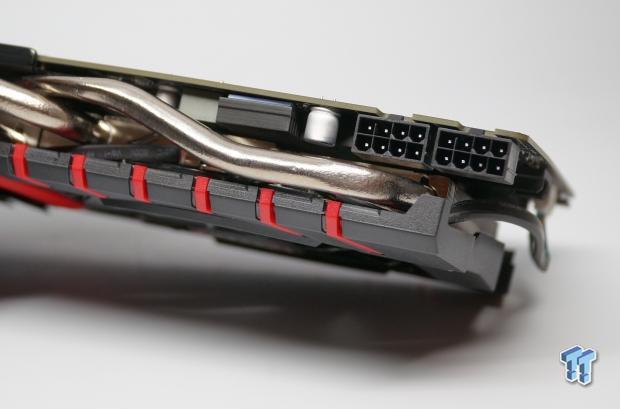
You'll need dual 8-pin PCIe power connectors to give the MSI GTX 980 Gaming 4G LE enough juice to run.
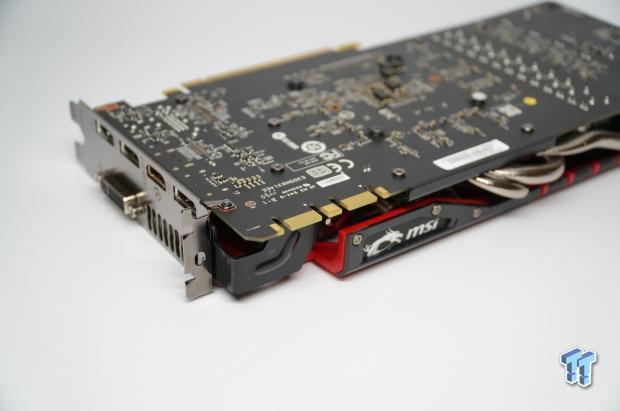
Here we have the two SLI connectors, which allow for 4-way SLI on the MSI GeForce GTX 980 Gaming 4G LE for some serious, serious power.
Card Specifications & Cooling Setup
Card Specifications
As we stated in our opening page of the review, MSI has two versions of the GeForce GTX 980 Gaming 4G, the stock Gaming 4G and the Gaming 4G LE with scaled back overclocks. It's still an overclocked GTX 980, but it is slightly less souped up.
Where the GTX 980 Gaming 4G has a Core Clock of 1216MHz in OC Mode, this card has a stock Core Clock of 1162MHz. This affects the Boost Clocks too, with the Gaming 4G higher at 1317MHz, while the Gaming 4G LE is clocked at 1253MHz.

There are three modes to the clock speeds too, with OC Mode, Gaming Mode and Silent Mode all offering varying speeds, as you can see from the screenshot above.
Cooling Setup
This is where MSI has one of the most unique, and one of the most powerful coolers on the market: Twin Frozr. MSI has provided the GeForce GTX 980 Gaming 4G LE with its impressive Twin Frozr V unit, which keeps the card around 17% cooler than the reference GTX 980 cooler. Under MSI's own testing, the reference GTX 980 sits at around 81C, while the Twin Frozr V keeps the GTX 980 at a much cooler 67C.
MSI's Twin Frozr V cooler on the GTX 980 Gaming 4G LE uses Torx fans, where the fan blades get the hot air away from the heat pipes much more efficiently. It disperses the air much quicker, getting it away from the heat sink and keeping your GPU much cooler.

Laying down, we see the card and its triple heat pipe design on the Twin Frozr V popping out.
Testing Method & Test System Configuration
Testing Method
Because I'm just starting out reviewing GPUs, we're going to slowly evolve our benchmarking setup. I'm not going to dive into the deep end and start testing out real-time FPS, as this will hurt the quality of the reviews. Instead, I'd like to nail these initial reviews and then we can start doing real-time numbers of games like Far Cry 4, and Star Citizen. For now, I've played Battlefield 4 on a 64-player server to provide some real-world performance numbers.
For now, I'm going to be using the same suite of benchmarks I've been using on my Tweakipedia articles, which uses a mix of synthetic benchmarks with Futuremark's 3DMark and Unigine Heaven. After that, we have a bunch of titles with built-in benchmarks (which does not represent actual in-game performance) but they are repeatable for you at home to gauge the performance of your PC or GPU.
Over time, I will be adding in new benchmarks and a new section that will concentrate solely on real-time gaming benchmarks. This will take more time per review, as I'll have to invest time into actually physically playing the games, but it'll be worth it in the long run. For now, let's get right into the synthetic benchmarks and see how this NVIDIA GeForce GTX Titan X performs.
Test System Configuration
We only recently built our new X99-powered system, something you can read about here. As for the detailed specifications, this is what we're running:
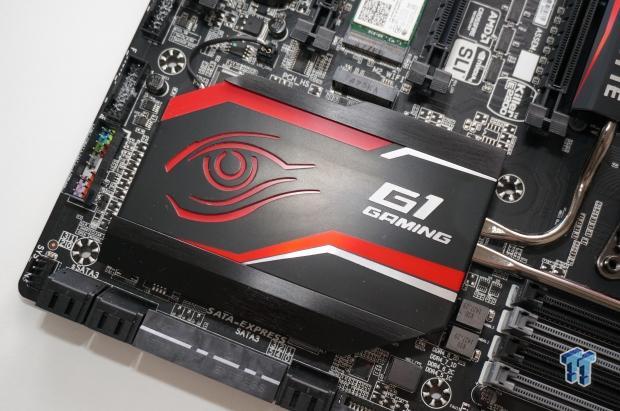
- CPU: Intel Core i7 5820K processor w/Corsair H110 cooler
- Motherboard: GIGABYTE X99 Gaming G1 Wi-Fi
- RAM: 16GB Corsair Vengeance 2666MHz DDR4
- Storage: 240GB SanDisk Extreme II and 480GB SanDisk Extreme II
- Chassis: Lian Li T60 Pit Stop
- PSU: Corsair AX1200i digital PSU
- Software: Windows 7 Ultimate x64
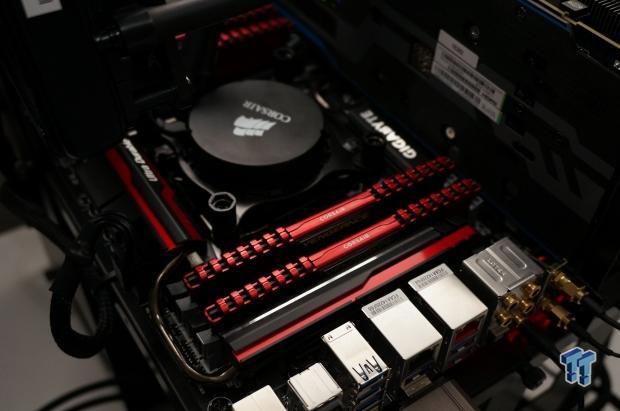
We're running the system at stock CPU speeds, which will provide more of a 'real-world' feel to our benchmarks. Sure, this isn't an i7-5960X at 5GHz, but what person is going to team up an incredibly expensive CPU with a mid-range GPU? Not many.
Our GPU tests are changing, shifting toward more of a real-world feel. But don't worry, we will be doing some crazy balls-to-the-wall tests that will see serious overclocks, Extreme Edition processors, and much more in the coming months. For the most part, we will be doing more real-world testing by teaming up the right processor with the right GPU in its price category.
Benchmarks - Synthetic (3DMark and Heaven)
3DMark Fire Strike - 1080p
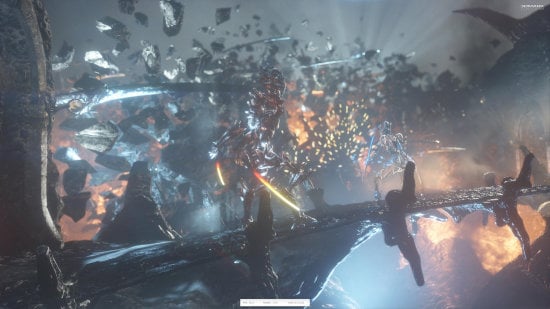
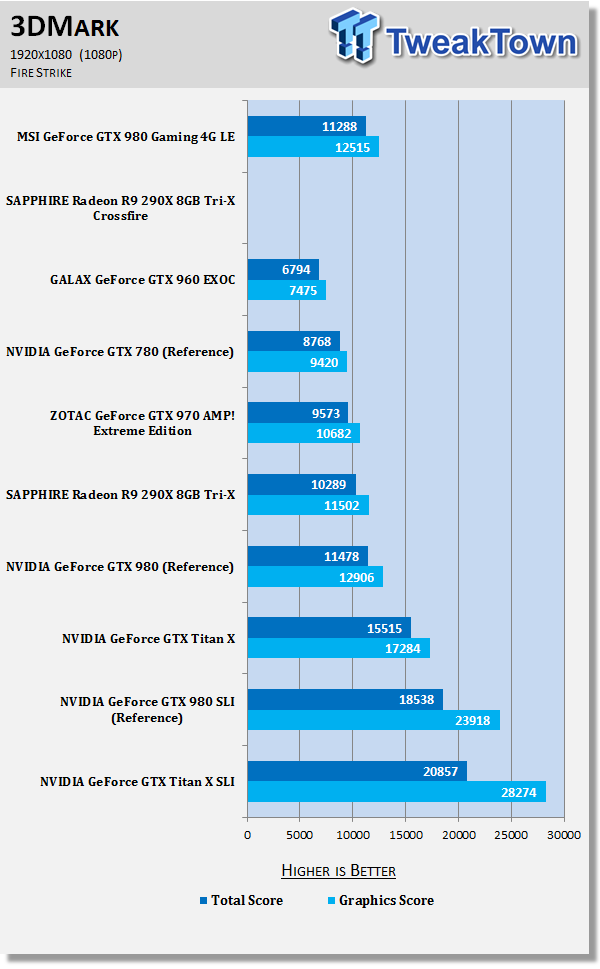
3DMark Fire Strike Extreme - 1440p
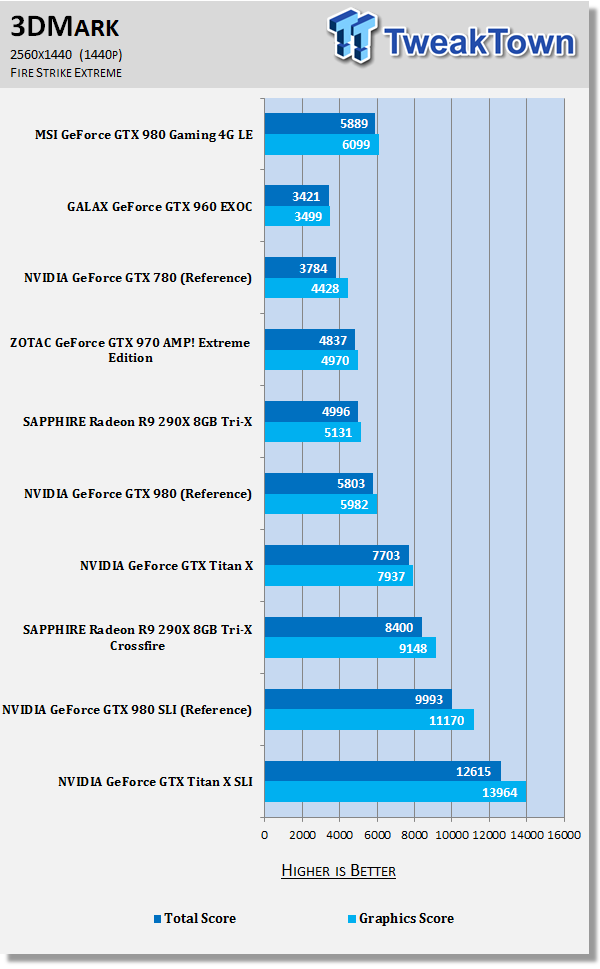
3DMark Fire Strike Ultra - 4K
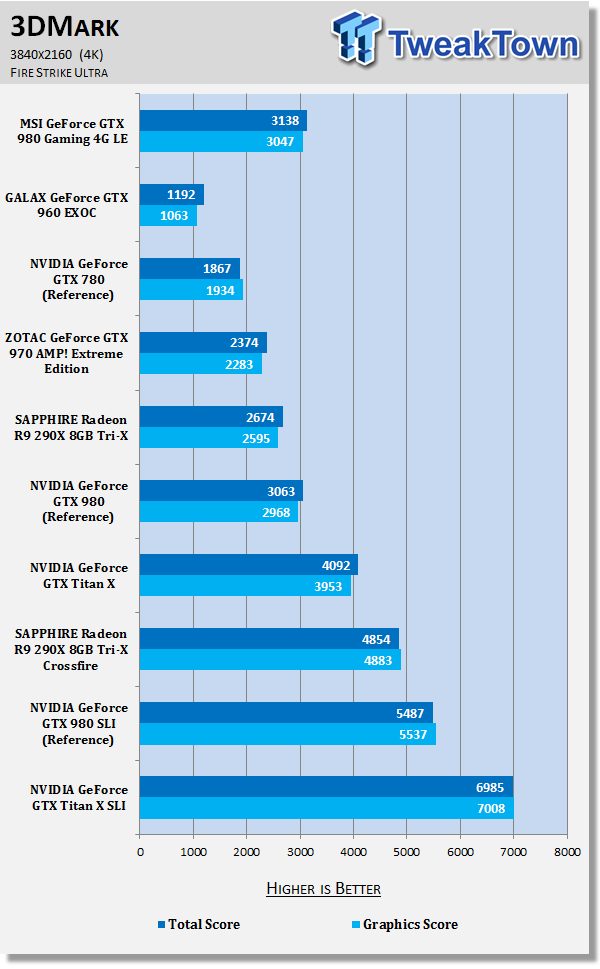
Heaven - 1080p
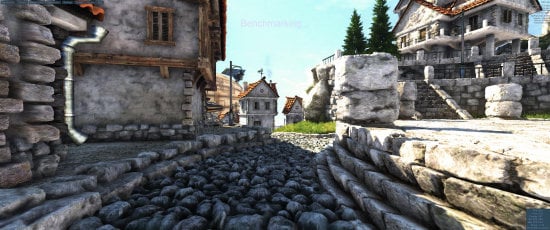
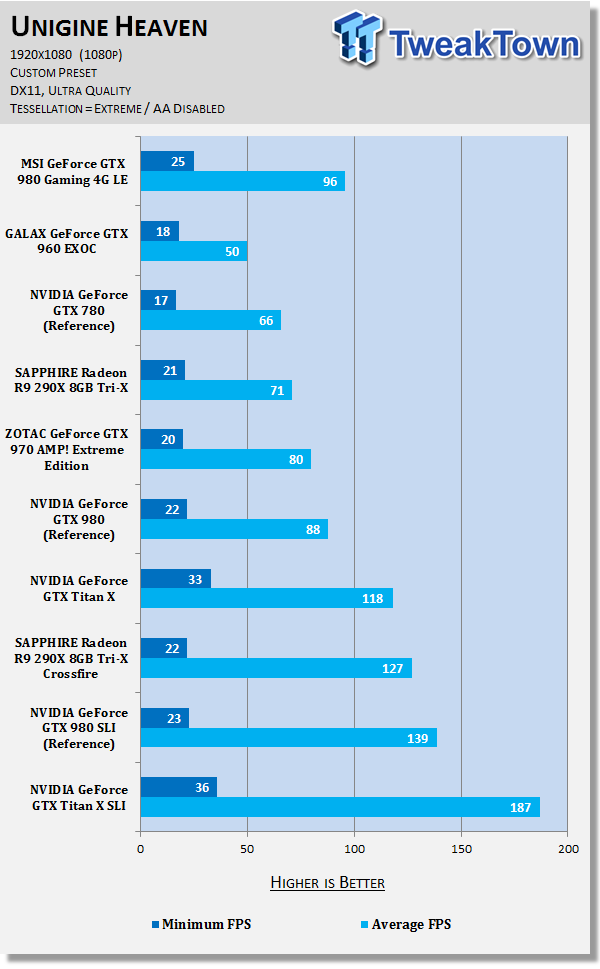
Heaven - 1440p
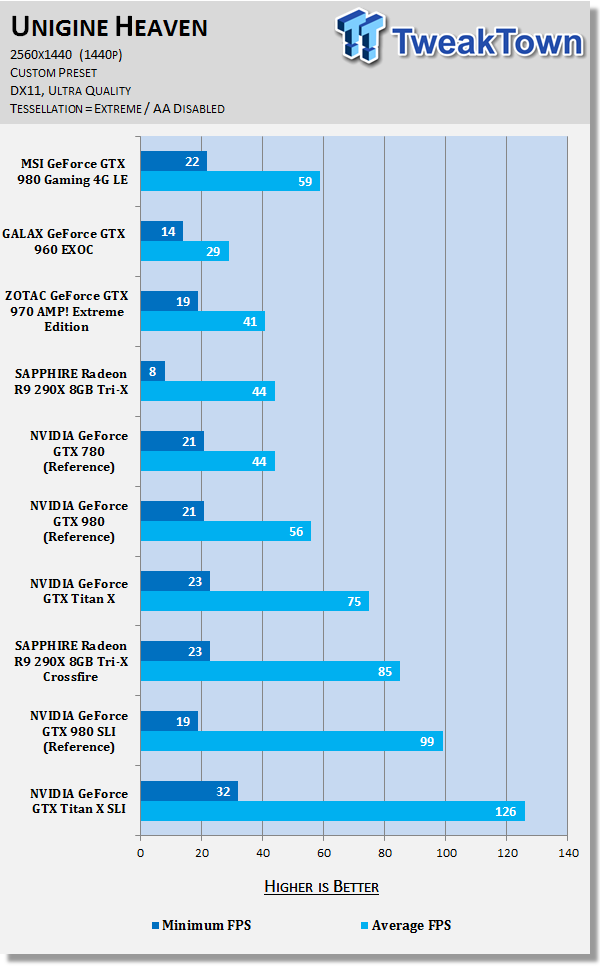
Heaven - 4K
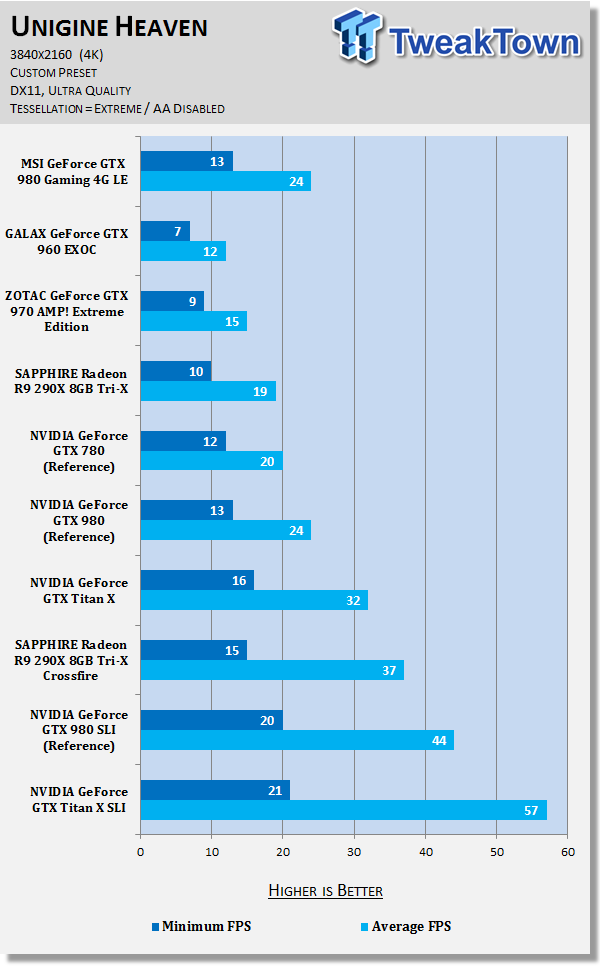
As always, we're starting with our 3DMark Fire Strike results at 1080p, in which the MSI card is actually a tiny bit slower than the reference GTX 980. But, at 1440p, the tables are turned: the MSI GeForce GTX 980 Gaming 4G LE is faster than the reference GTX 980. The same goes for the Fire Strike Ultra benchmark at 4K, with the MSI card coming out on top.
While the MSI card lost to the reference GeForce GTX 980 in 3DMark's Fire Strike test at 1080p, the same doesn't apply to Unigine Heaven at 1080p. The MSI card beats the reference GTX 980 by 8FPS, or 9%. At 1440p, the improvement isn't so big at just 3FPS better for MSI. Cranking the resolution up to 3840x2160, or 4K, we see the MSI GeForce GTX 980 Gaming 4G LE neck and neck with the reference GTX 980 with 24FPS.
Game Benchmarks (1080p)
Battlefield 4
This is one game that we did differently, as it does not feature a built-in benchmarking feature. When it comes to Battlefield 4, there are countless ways you can benchmark it. Some find a spot in the single player campaign which is easily repeatable, and use that. For our testing, we've chosen to use a 64-player online multiplayer server for real-time performance statistics.
We joined a 64-player map and played for five minutes using FRAPS, pulling our minimum/average and maximum FPS. We did this for each test, we run the game for 5 minutes at 1080p/1440p and 4K two times each. One time with Medium settings, and another with a custom Ultra preset (disabling AA). It's time consuming, but it gives us a perfect look into true real-world performance.
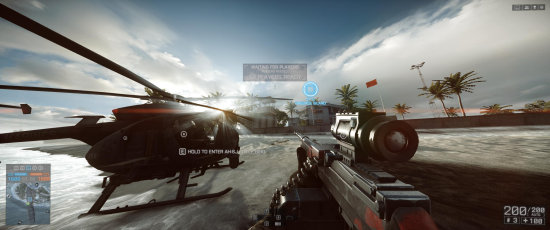
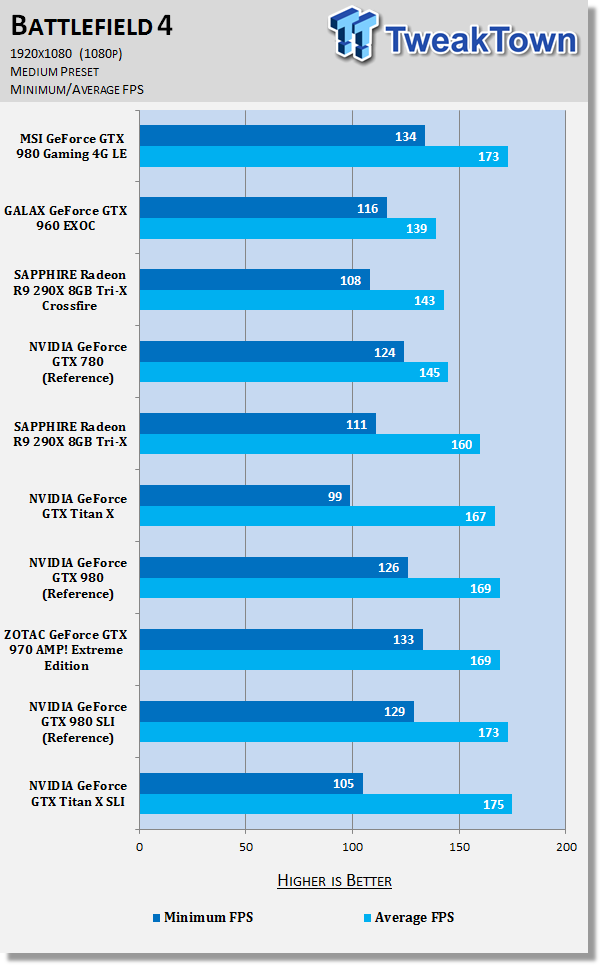
And again, this time with the Ultra preset.
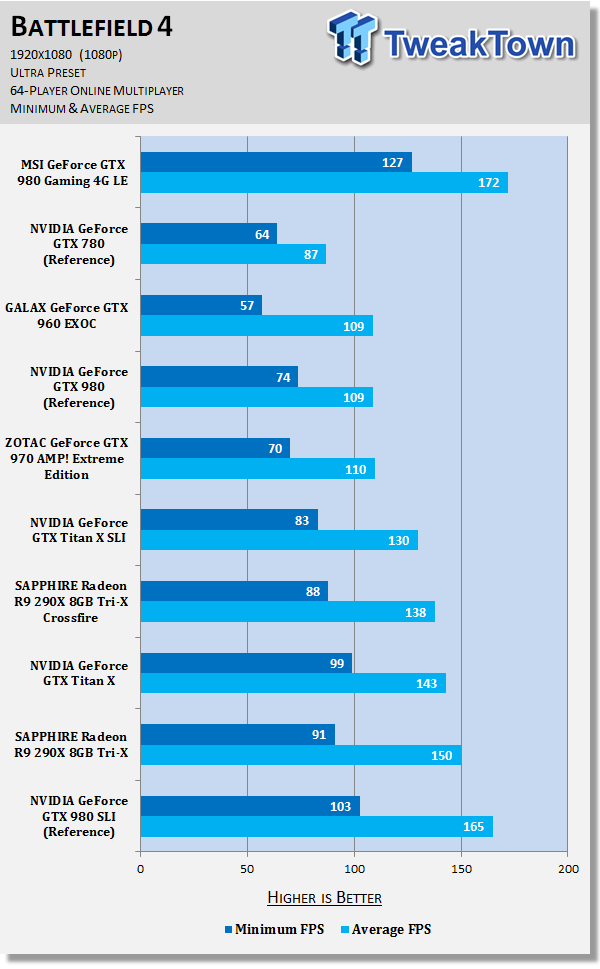
Grand Theft Auto V

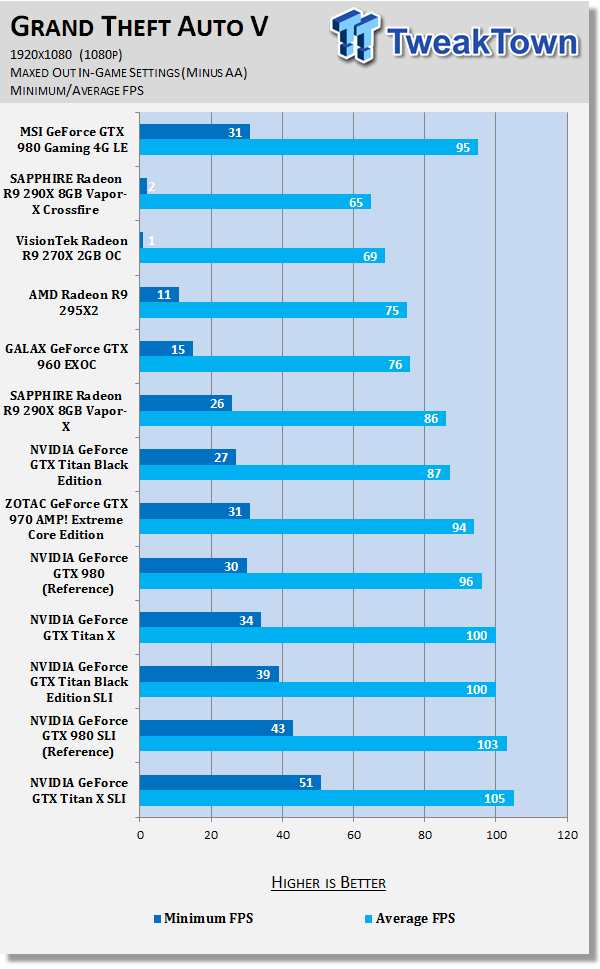
GRID Autosport
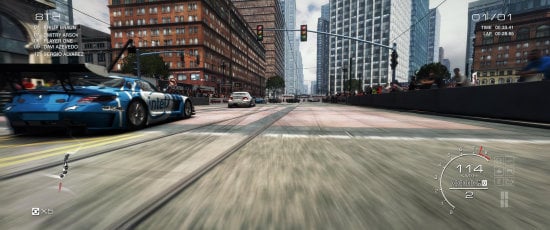
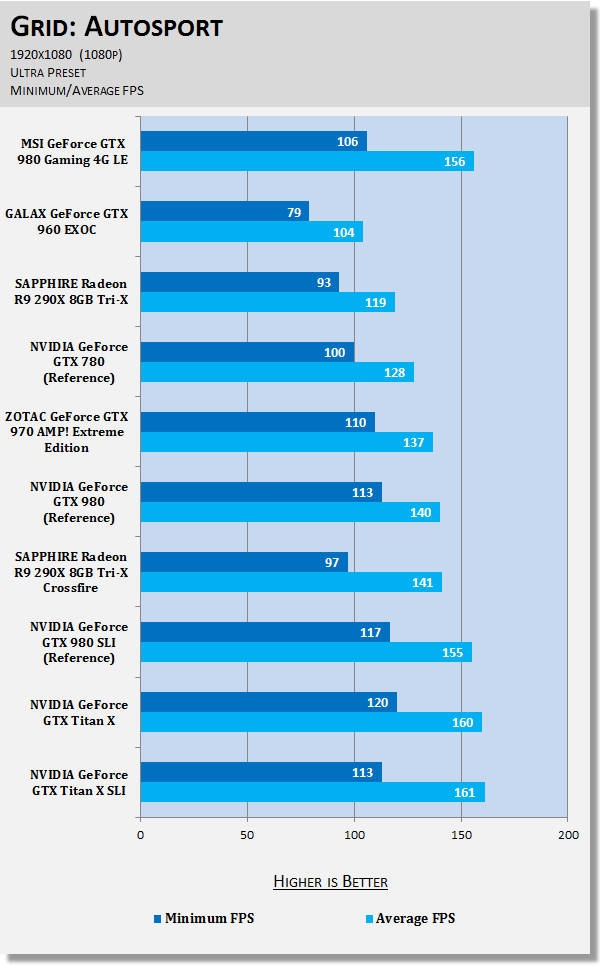
Metro: Last Light

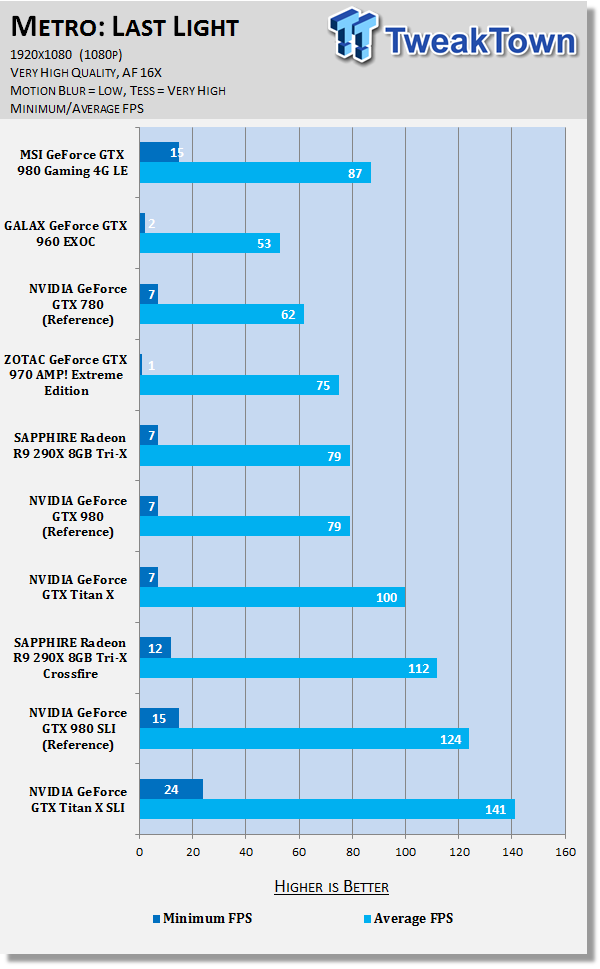
Middle-earth: Shadow of Mordor

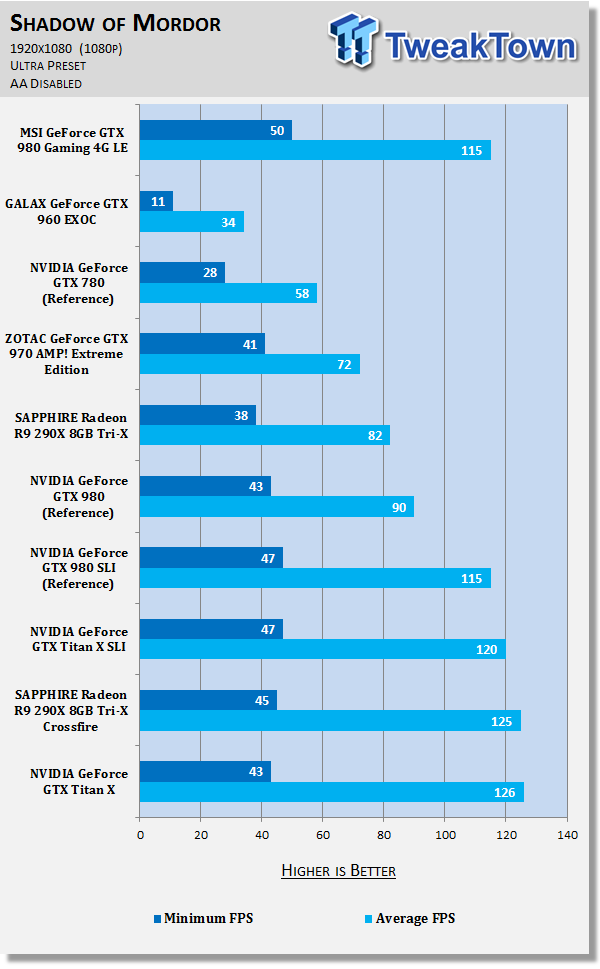
Thief

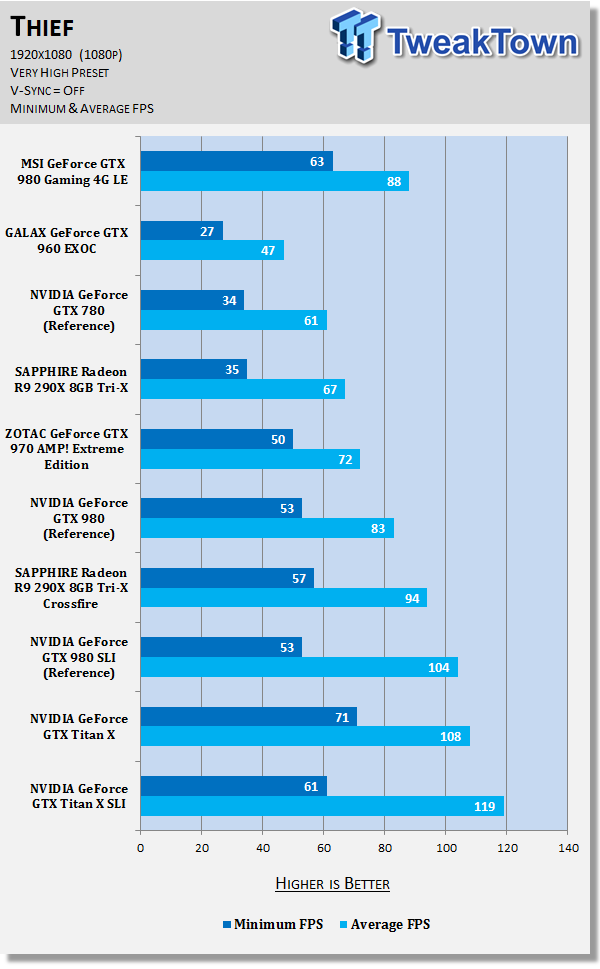
Tomb Raider

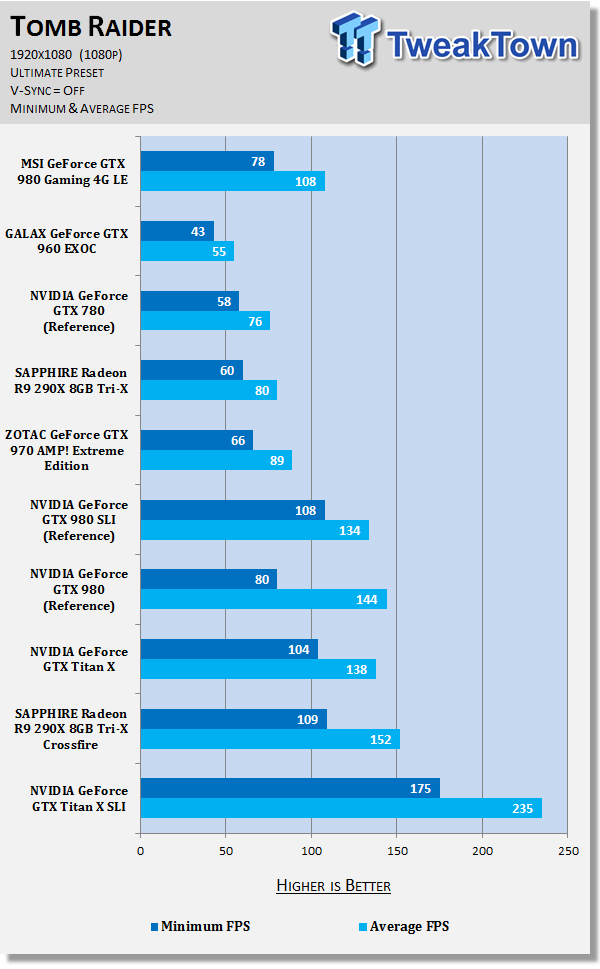
BioShock Infinite

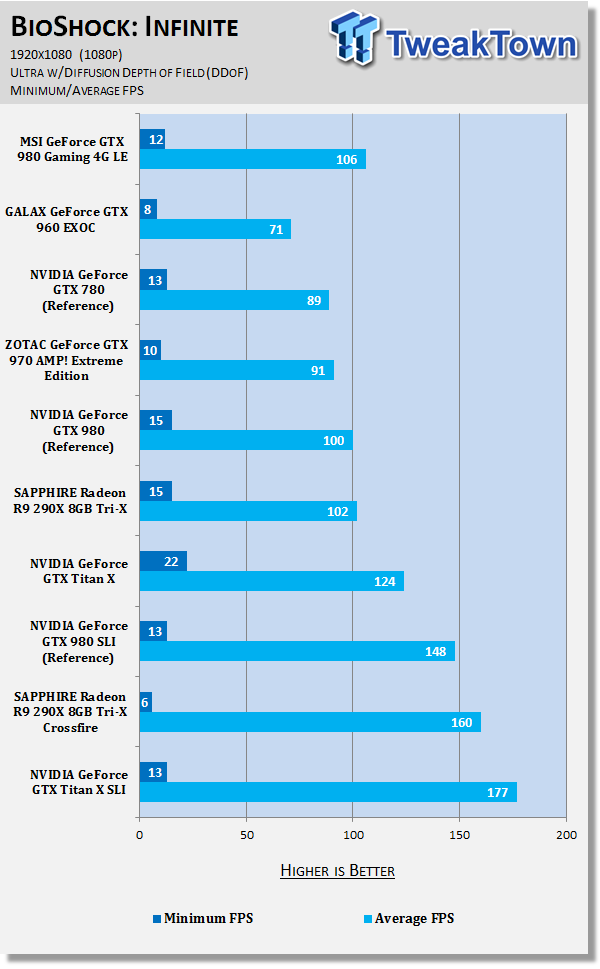
DiRT Showdown
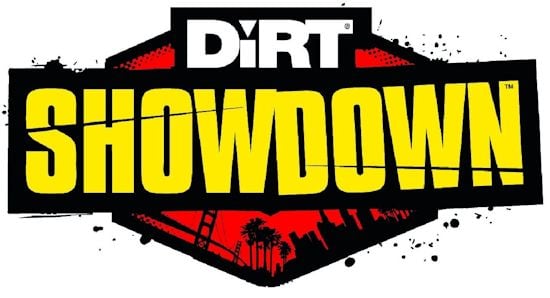

You can find our performance summary of all of our gaming tests later in the review.
Game Benchmarks (1440p)
Battlefield 4

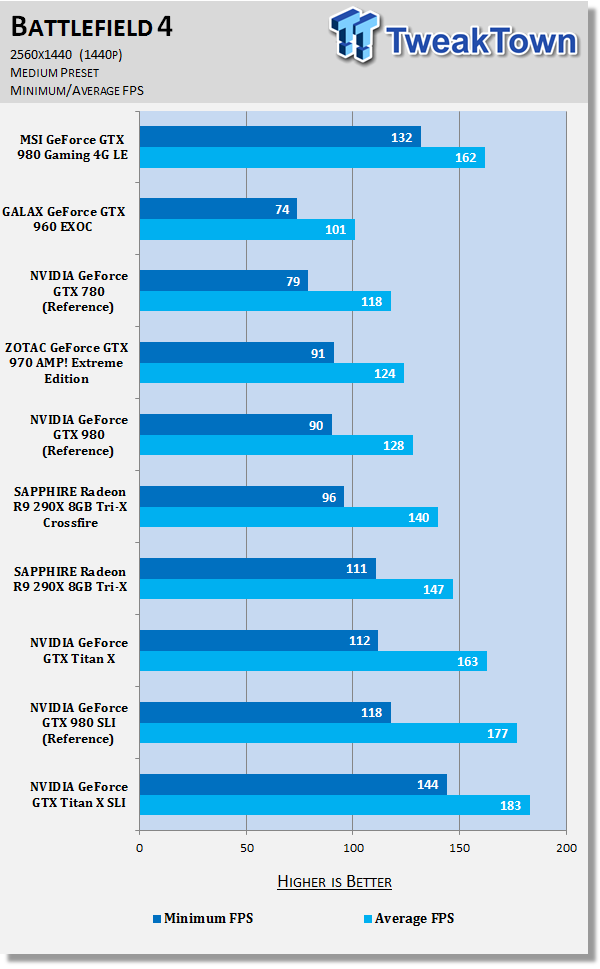
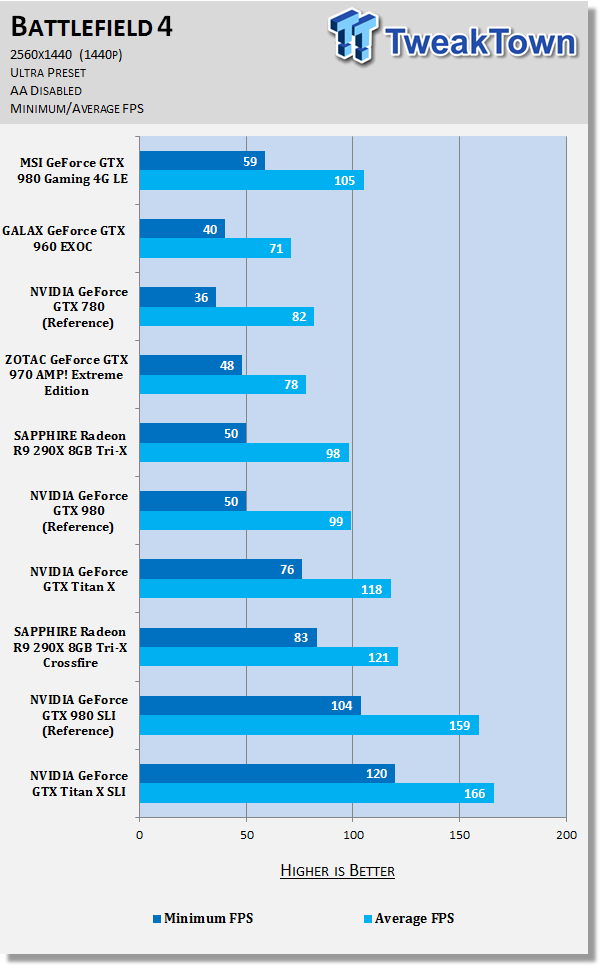
Grand Theft Auto V

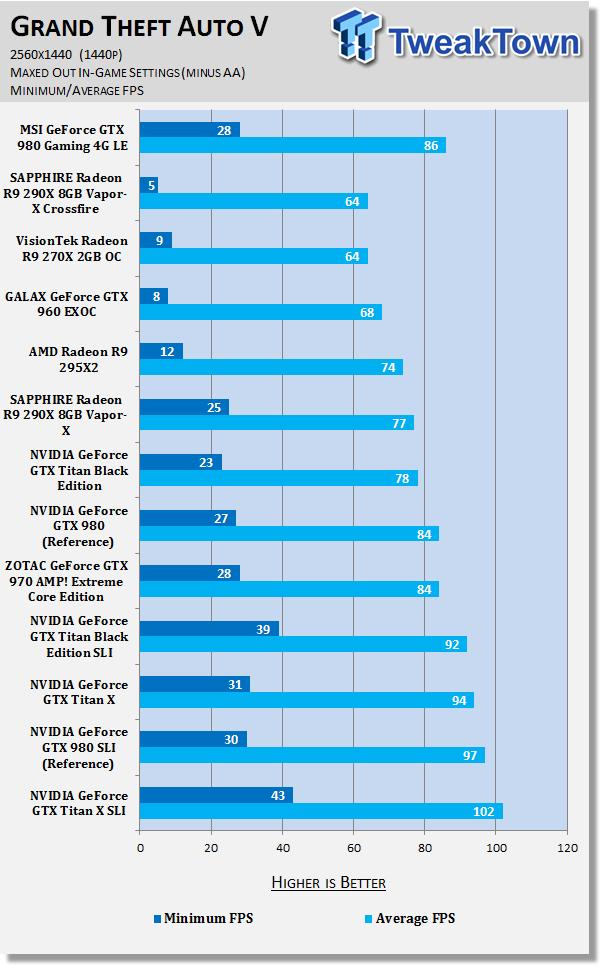
GRID Autosport

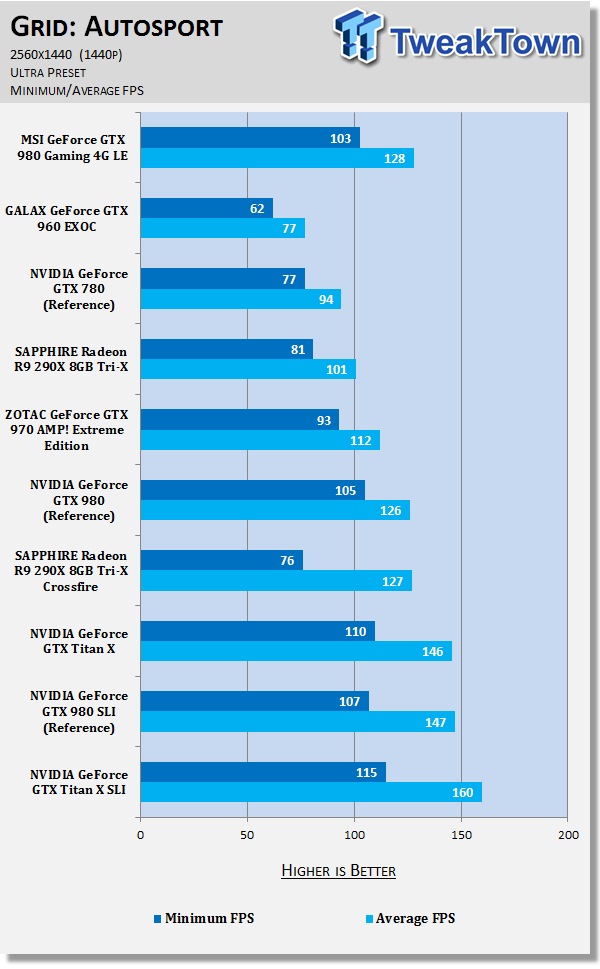
Metro: Last Light

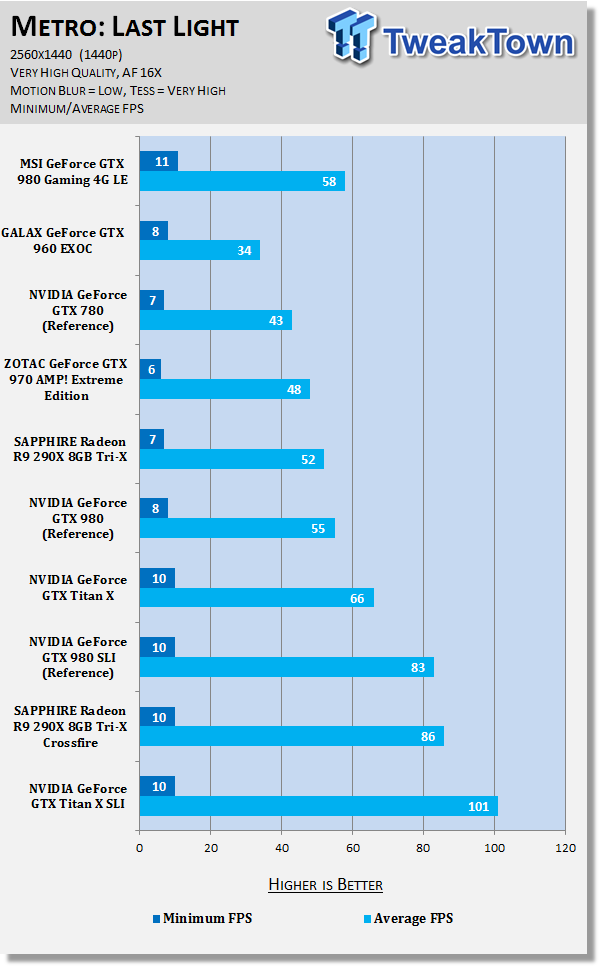
Middle-earth: Shadow of Mordor

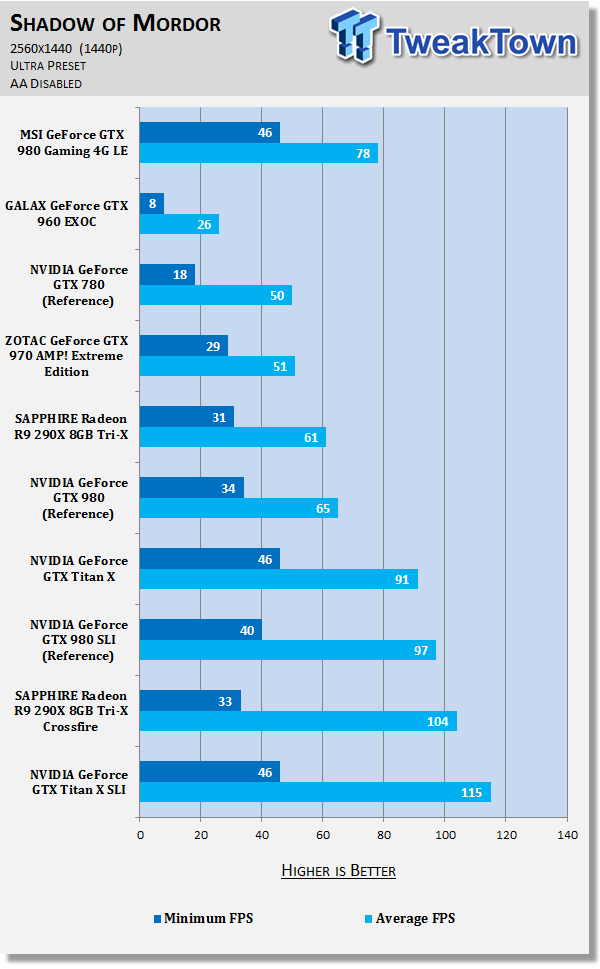
Thief

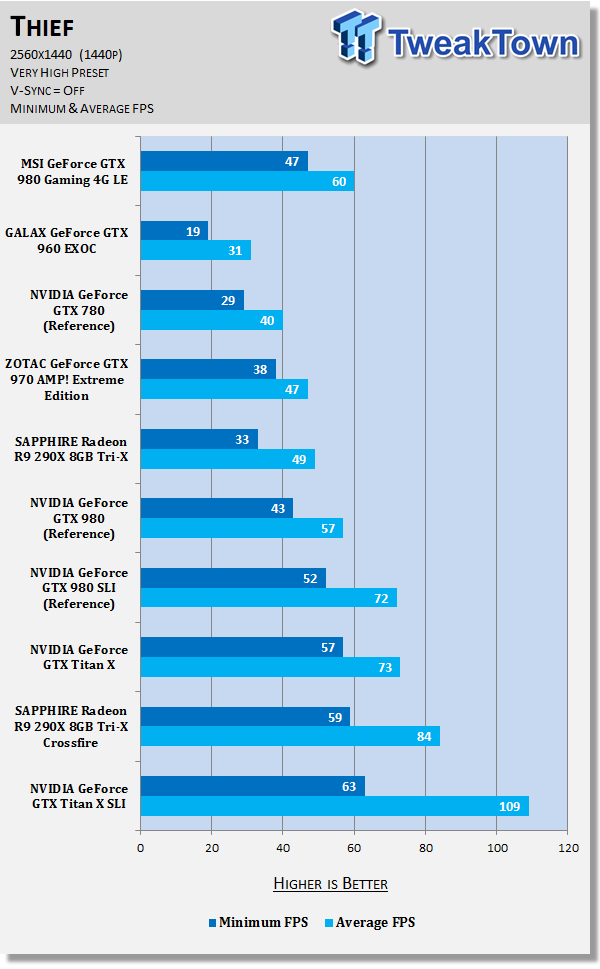
Tomb Raider

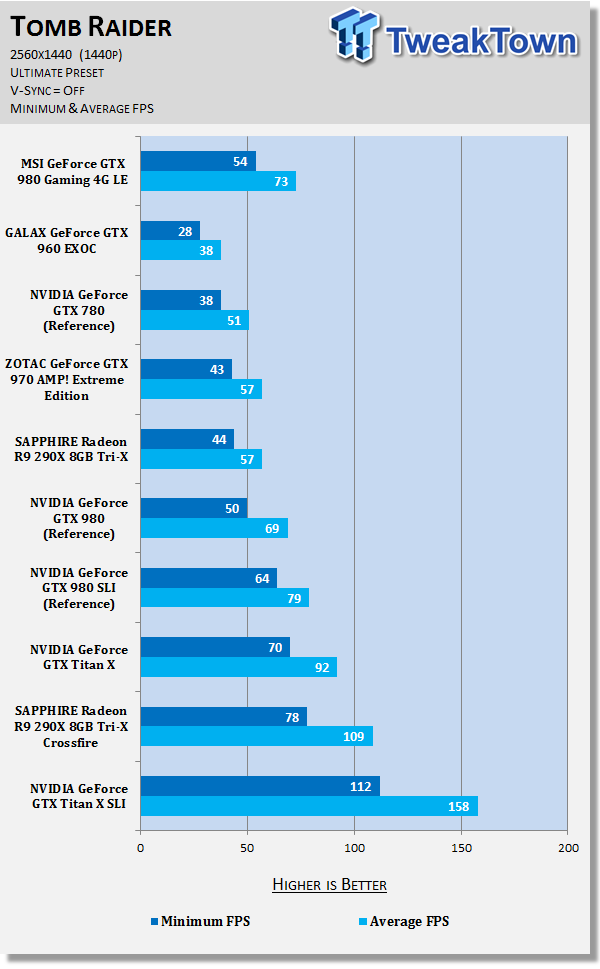
BioShock Infinite

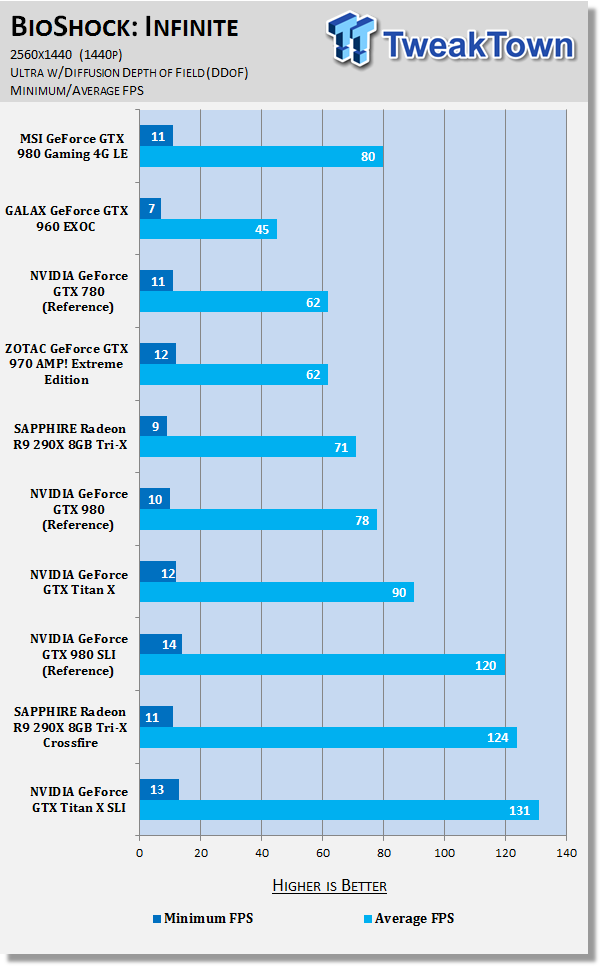
DiRT Showdown


You can find our performance summary of all of our gaming tests later in the review.
Game Benchmarks (4K)
Battlefield 4

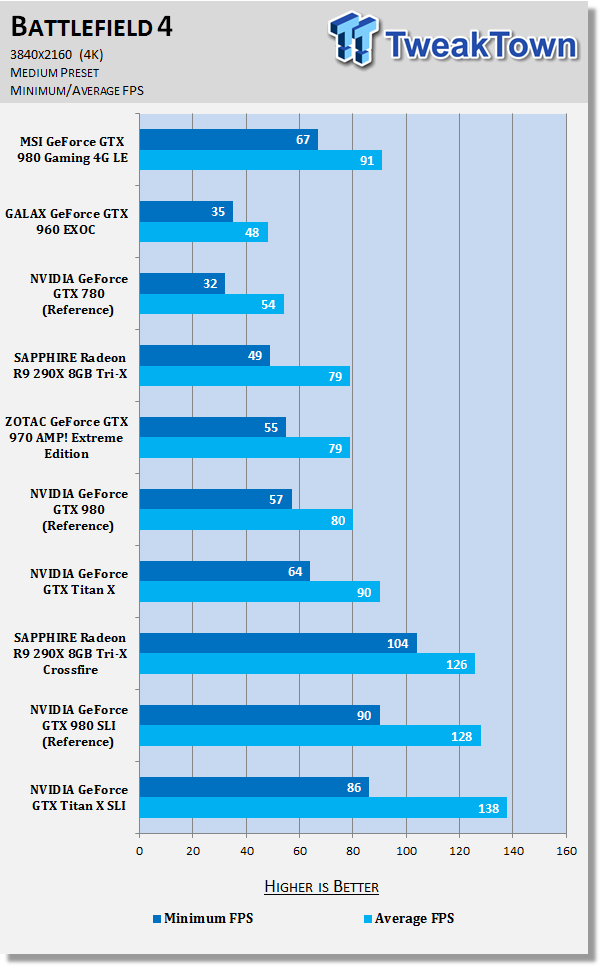
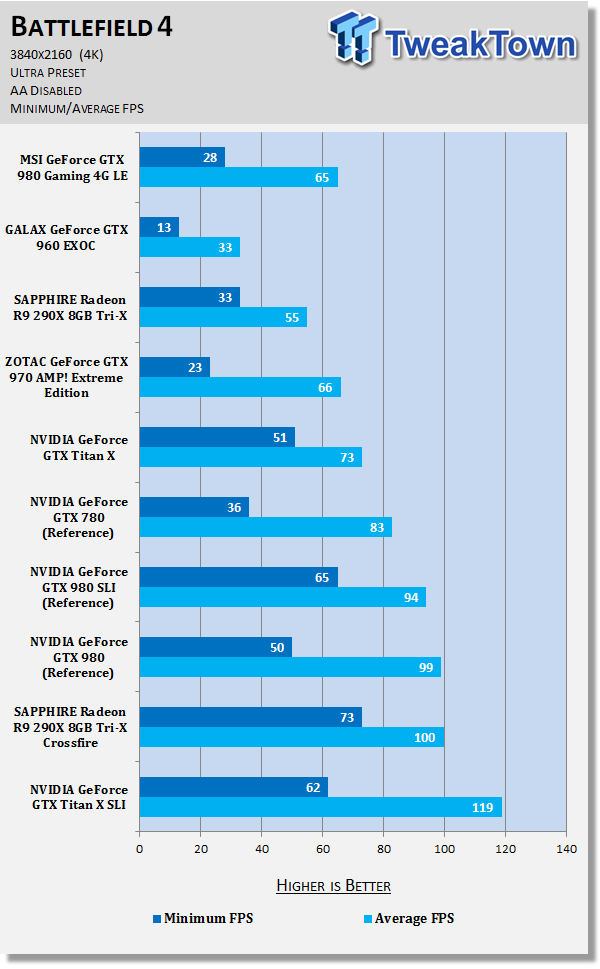
Grand Theft Auto V

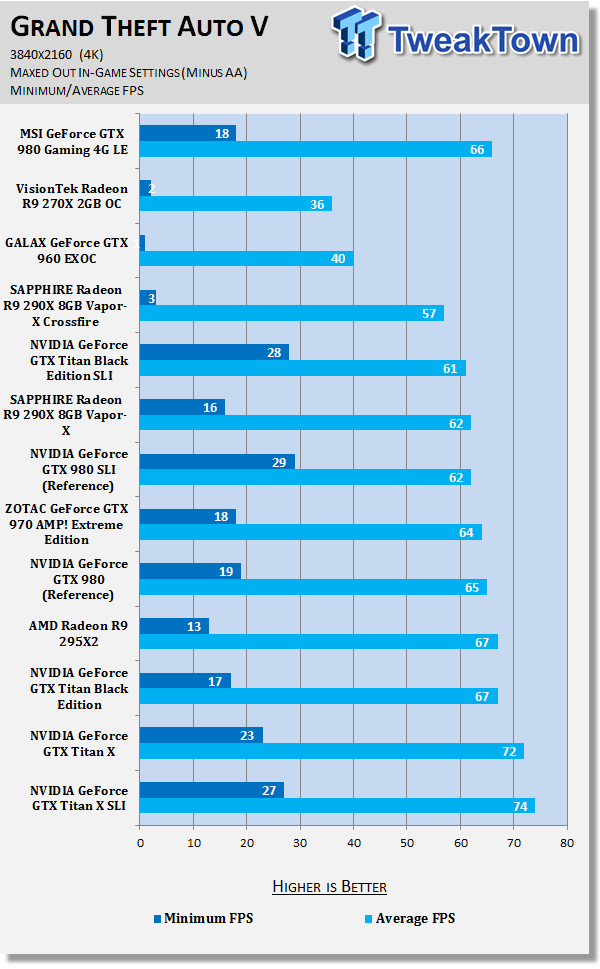
GRID Autosport

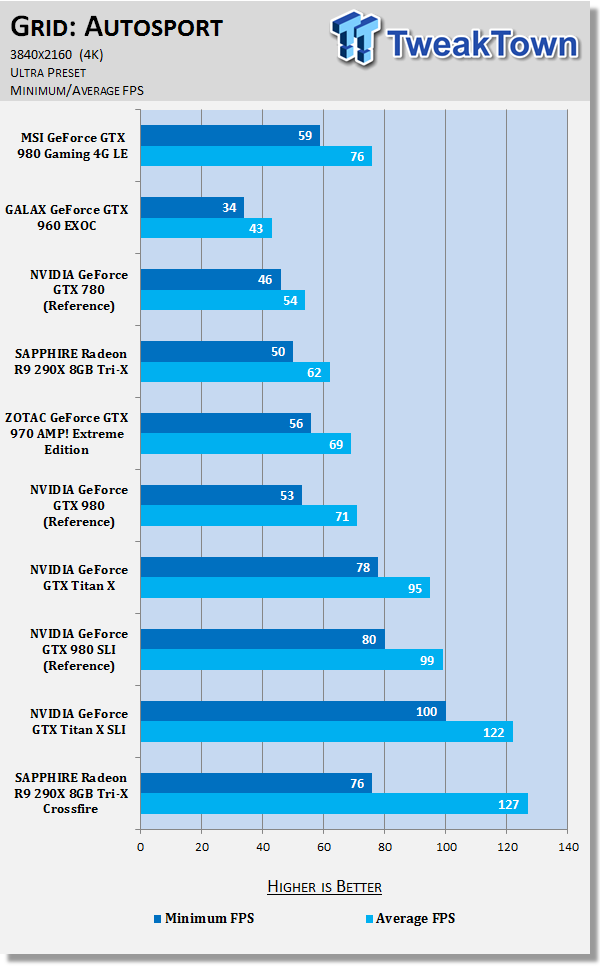
Metro: Last Light

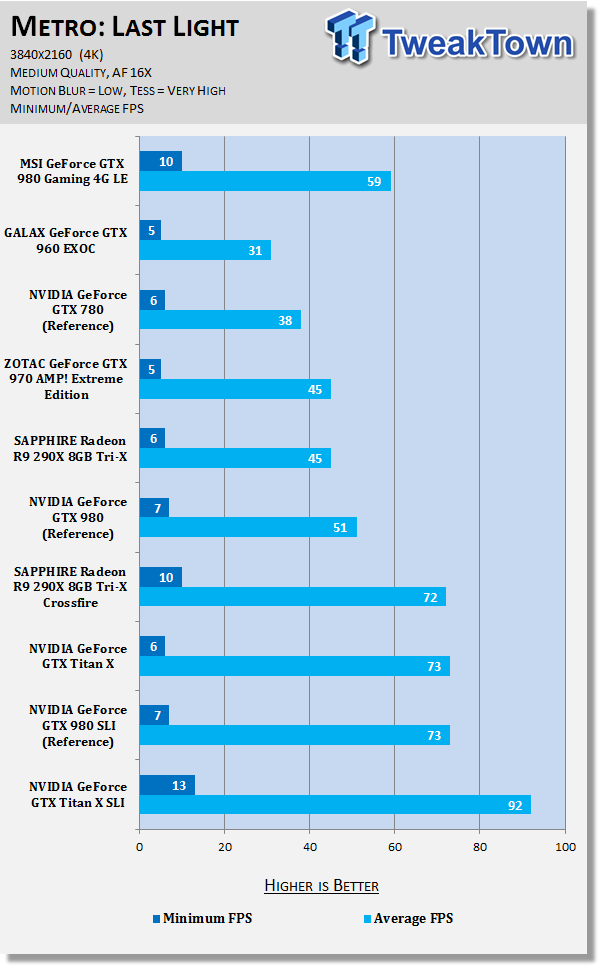
Middle-earth: Shadow of Mordor

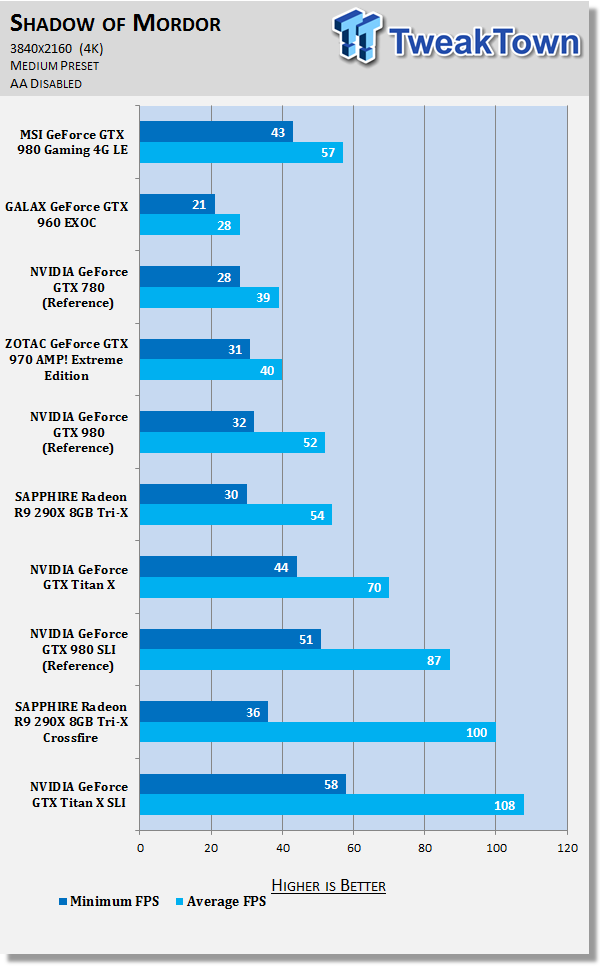
Thief

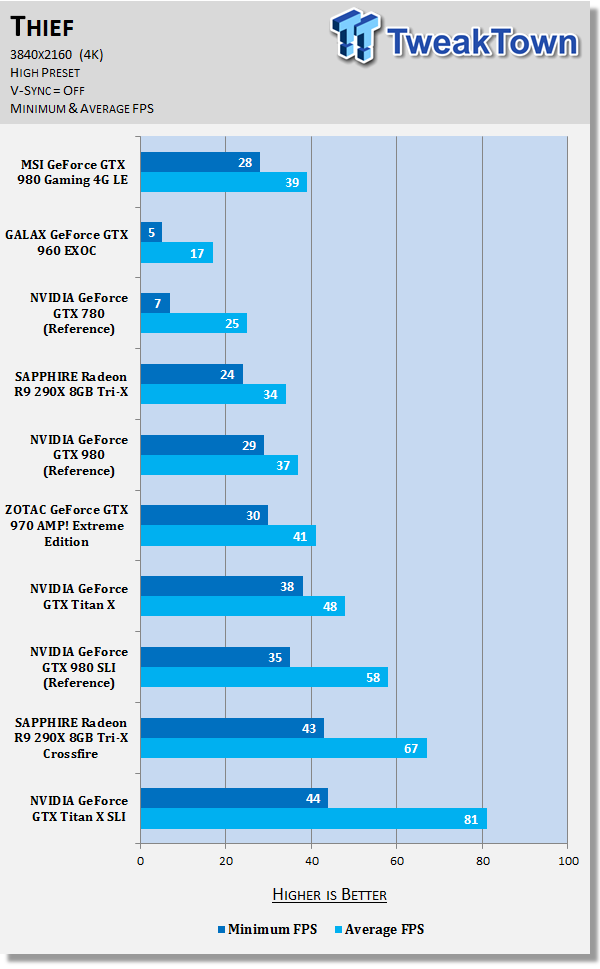
Tomb Raider

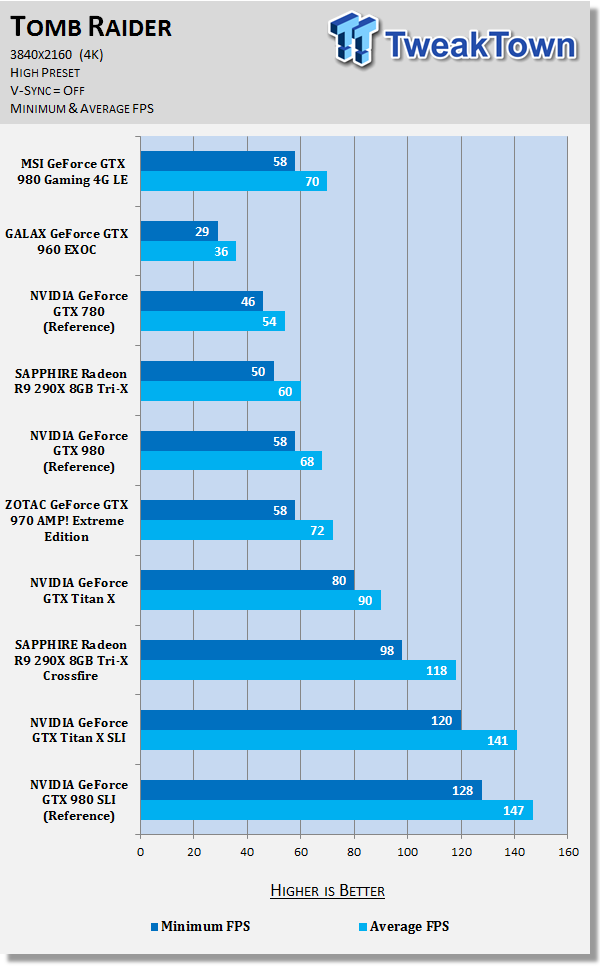
BioShock Infinite

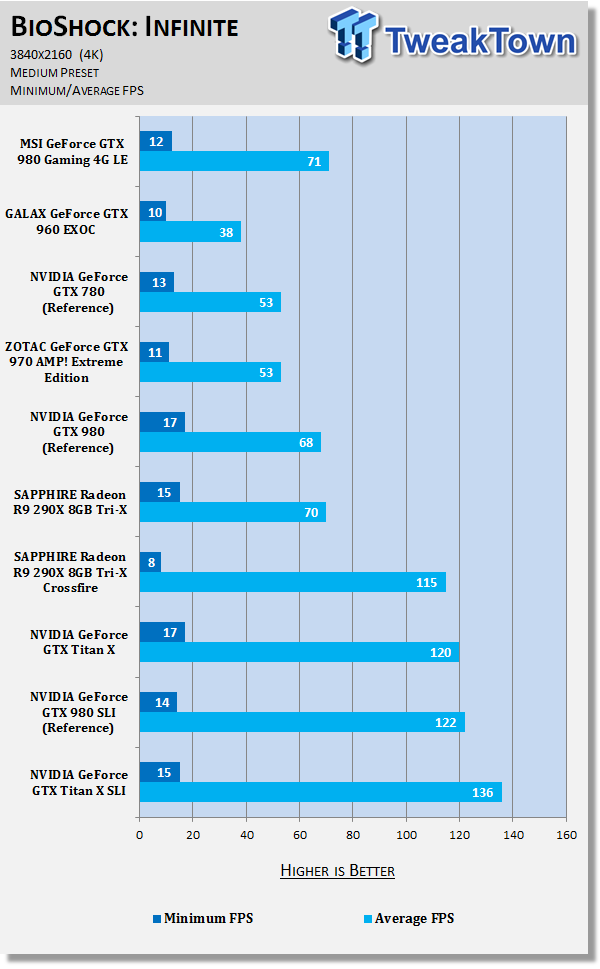
DiRT Showdown


You can find our performance summary of all of our gaming tests later in the review.
Performance Summary
How Does the MSI GeForce GTX 980 Gaming 4G LE?
The MSI GeForce GTX 980 Gaming 4G LE is an awesome card, with around 10-20% additional performance over the reference GTX 980 from NVIDIA. It is a card that has some nice tricks, such as the three modes of operation for its clock and fan speeds. Let's see how the card performed in our usual 1080p, 1440p and 4K testing.
Performance at 1080p
As always, we start with our finding on Battlefield 4 at 1080p. With the Medium preset, the GTX 980 Gaming 4G LE is pushing the boundaries of the Frostbite engine with 173FPS average. On the Ultra preset (minus AA), we have mammoth performance of 172FPS average, beating out every configuration - even the Titan X SLI. But, it's at 1080p and Titan X SLI doesn't really have much to do at 1080p.
We have 156FPS average in GRID: Autosport, which is a nice jump on the reference GTX 980, and it even beats out the GTX 980 SLI by 1FPS. In Metro: Last Light, we see some great gains on the reference GTX 980, too. Middle-earth: Shadow of Mordor results were more than impressive, with 115FPS average at 1080p, beating out the reference GTX 980 by a huge 25FPS.
Performance at 1440p
The additional performance of the MSI GeForce GTX 980 Gaming 4G LE really came into play with Battlefield 4 at 2560x1440, where we see a 26% jump in performance over the reference GTX 980. 162FPS average at 1440p on Medium detail is very impressive, as it even keeps up with the Titan X. As for Ultra, we see the MSI GTX 980 Gaming 4G LE beating the Titan X by 3FPS - which is something worth writing home about.
The MSI card beats out the reference GTX 980 by 2FPS in GRID: Autosport, but loses quite heavily to the Titan X. Metro: Last Light sees the same performance from MSI, beating out the reference card from NVIDIA, but losing to the Titan X once again. Things turn around for Shadow of Mordor, with an extra 13FPS over the reference card, a jump of 20%.
Our latest benchmark is the built-in one from Grand Theft Auto V, where we see the MSI GeForce GTX 980 Gaming 4G LE capable of 86FPS at 1440p, against the 84FPS on the reference card.
Performance at 4K
Starting with Battlefield 4 on our Medium preset, the MSI GeForce GTX 980 Gaming 4G LE once again beats the reference card by a nice margin of 13%. At 1440p and Medium, it even beats the Titan X by a single frame.
Testing out GRID: Autosport, the GTX 980 Gaming 4G LE beats out the reference GTX 980 by 5FPS. Metro: Last Light enjoys the added performance from the MSI card over the reference GTX 980, with an additional 8FPS, or 15%. Shadow of Mordor also sees an improvement, with 5FPS or 10% more than the reference GTX 980.
Overclocking
Overclocking - Let's See How Far We Can Go
I didn't think there would be much headroom left in the card, but we did get a seriously nice overclock from it. Unusually, the two fans didn't make that much noise even under our heavy overclock. With our heavy Battlefield 4 sessions, only one of the fans actually spun up. This provides an excellent experience for gaming, as you're able to squeeze performance from the card, all while enjoying a quiet gaming experience.
We were able to crank up the Core Clock from its stock speed of 1140MHz to 1371MHz, which resulted in increasing the Boost Clock from 1241MHz to 1472MHz. The RAM we were able to clock up too, from 1753MHz to 1864MHz.
When it comes to the performance benefit, we have some great results to share.
Battlefield 4

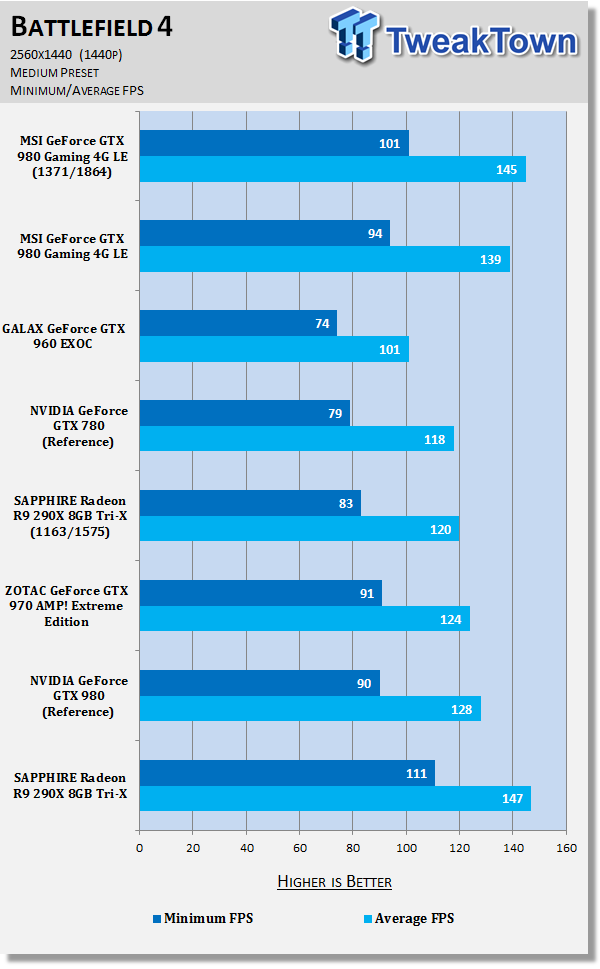
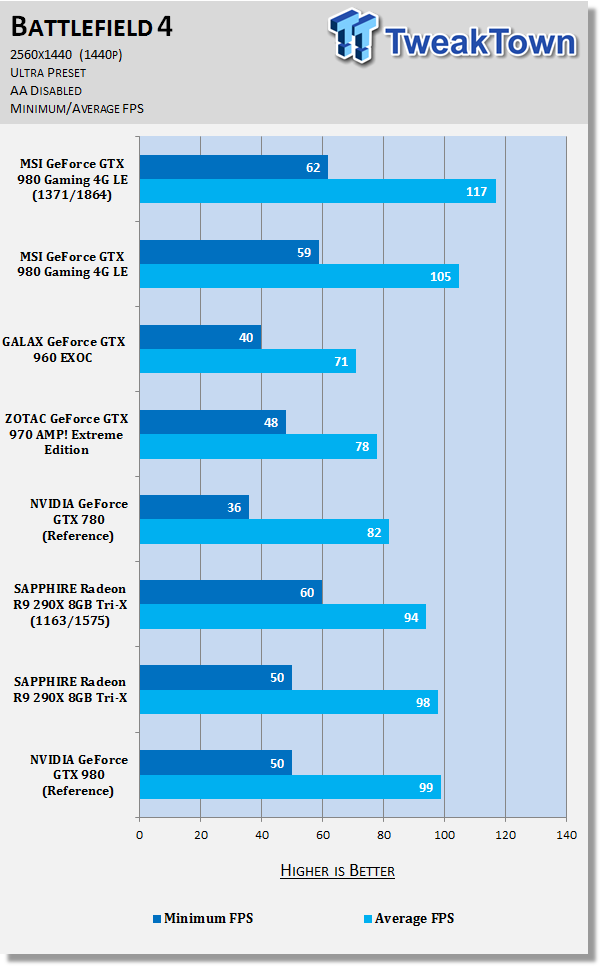
Metro: Last Light

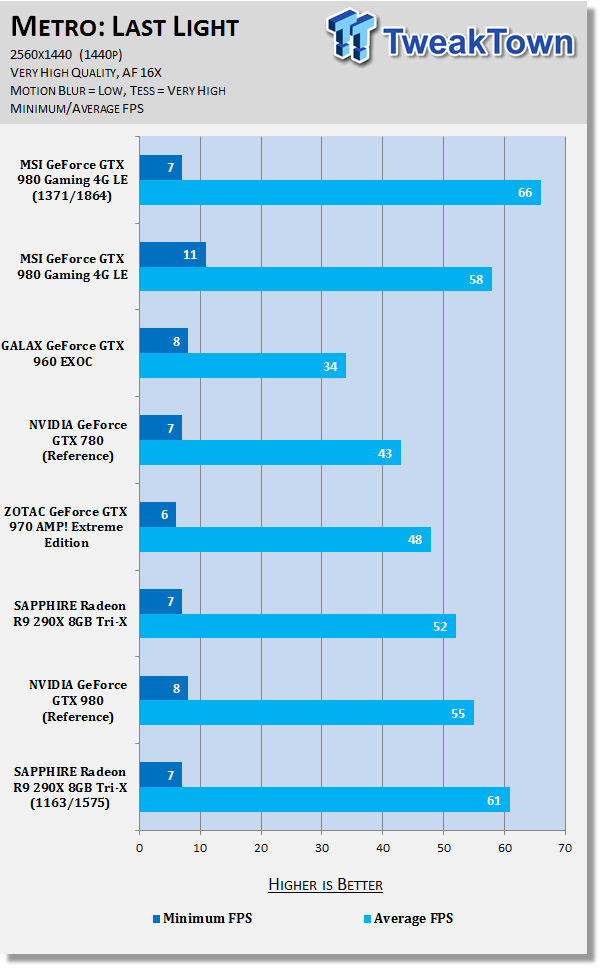
3DMark Fire Strike Extreme - 1440p
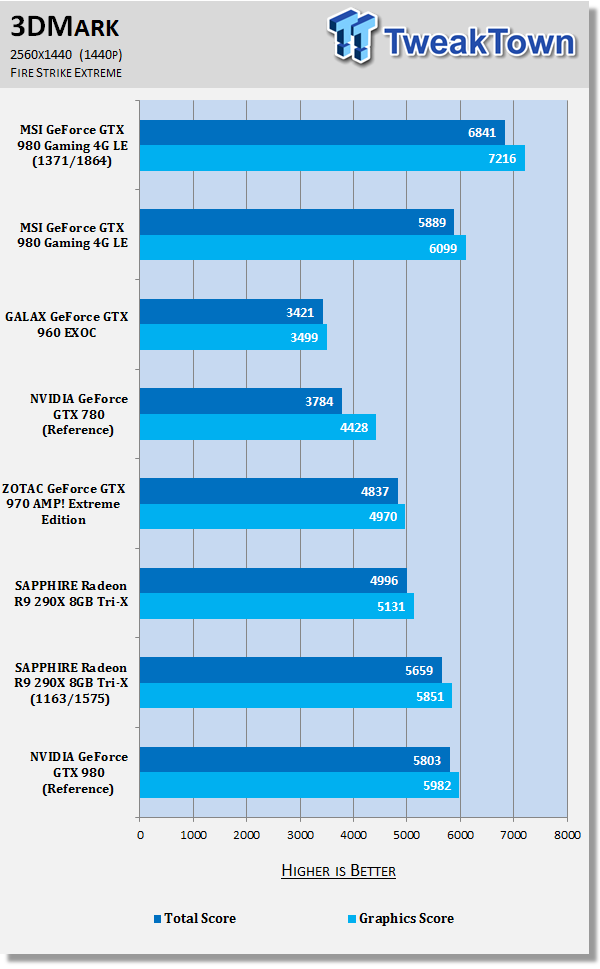
Heaven - 1440p

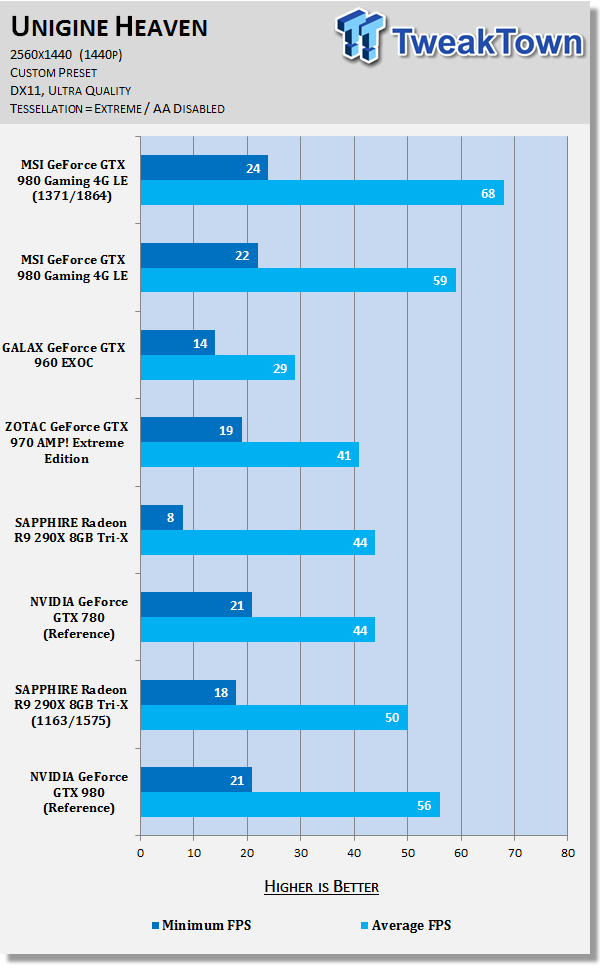
Power Consumption and Sound Testing
Power Consumption
With our reference GeForce GTX 980 from NVIDIA consuming around 280W, the MSI GeForce GTX 980 Gaming 4G LE was consuming 320W or so during our Battlefield 4 testing at 2560x1440. Considering the MSI card has two 8-pin PCIe power connectors versus the two 6-pin PCIe power connectors on the reference card, this is not too much more power.
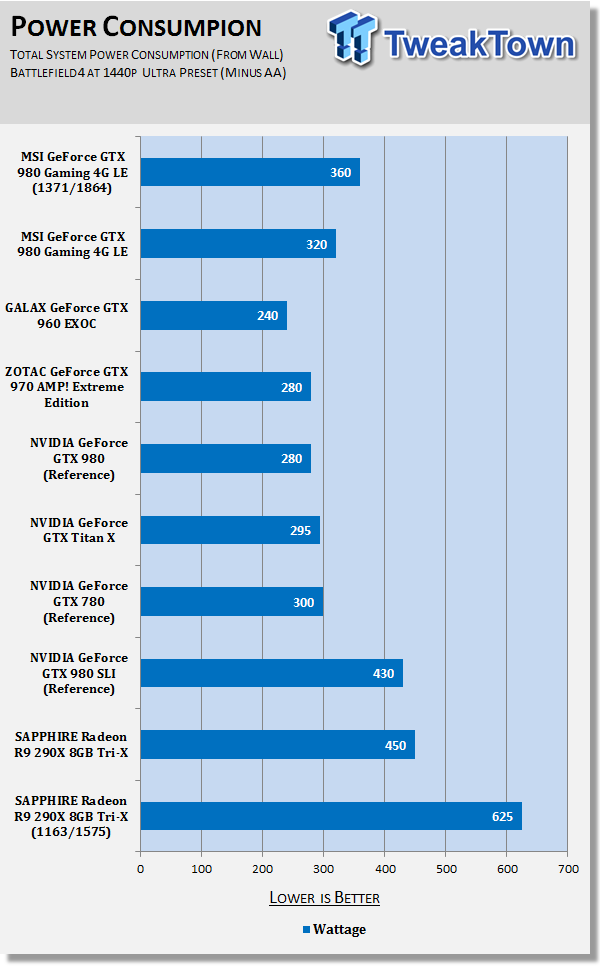
But as you can see, from our overclocking on the MSI card, the power consumption jumps up 40W to 360W or so in Battlefield 4. 360W is still fine, as its 90W lower than the SAPPHIRE Radeon R9 290X 8GB Tri-X, and 265W less than the same card from SAPPHIRE but overclocked.
Sound Testing
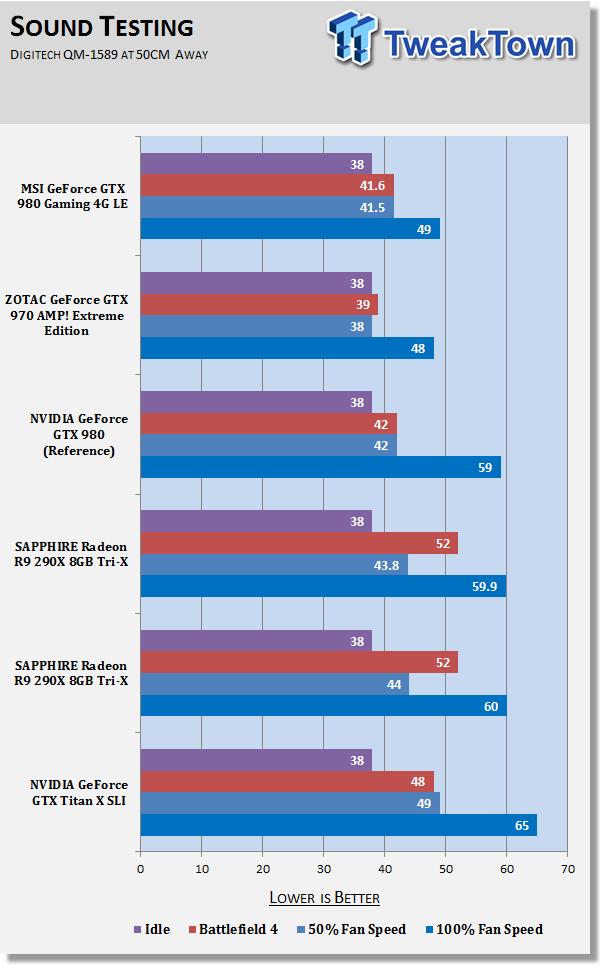
As you can see, the MSI GeForce GTX 980 Gaming 4G LE is one of the quietest cards we've tested.
Software
Does MSI have any software? Well, some of you might have heard of a little piece of software known as Afterburner, or MSI Afterburner. MSI has been the leading charge of overclocking software for quite some time, and it has only continued to grow.
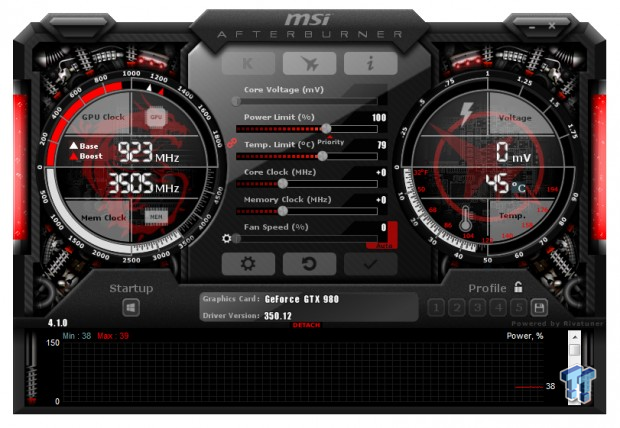
Opening up MSI Afterburner, you'll be greeted with a speedometer-like interface. On the left, we have all of the information on Core/Boost Clock/RAM speeds. In the middle, we have all of the controls for power limit, temperature limits, Core Clock and Memory Clock as well as the Fan Speed. To the right, we have a look at voltages and temperatures.
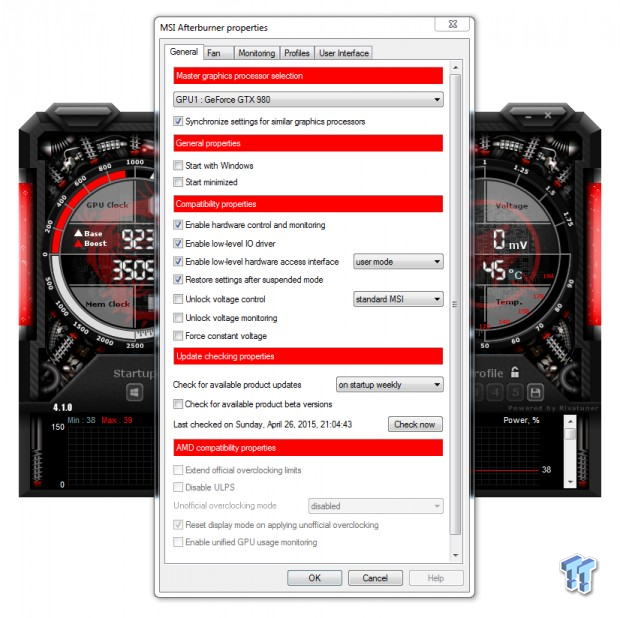
Opening up the settings, Afterburner gives you plenty of options to play around with your software so that you can keep a great eye on your VGA card. You can synchronize your GPUs if you're running a multi-GPU setup, and countless other options as you continue into familiarizing yourself with Afterburner.
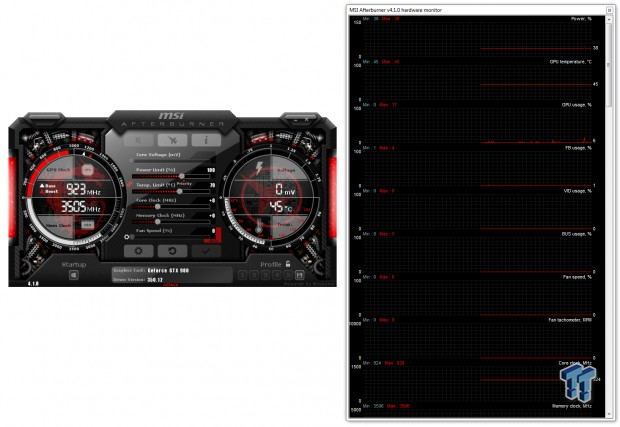
Here, we have a shot of them open side-by-side as you can detach the hardware monitor. This is a great way of keeping an eye on the various parts of your VGA card, in great detail.
What's Hot, What's Not & Final Thoughts
This is where you can fast forward to the final section of the review, and get a quick recap and points on the MSI GeForce GTX 980 Gaming 4G LE.
What's Hot
Twin Frozr V Technology: MSI's all-class, all-performance Twin Frozr V cooling technology is second to none. It's an impressive piece of kit, and something that makes the MSI GeForce GTX 980 Gaming 4G LE worth the money.
Kick Ass Performance: Performance on the MSI GeForce GTX 980 Gaming 4G LE is nothing less than impressive, and that's with the factory overclock. When you throw in the huge overclocking headroom you have, there's an even bigger kick for performance.
Quiet Operation: During our stressful Battlefield 4 testing, the card wasn't even making noise. Even when we had the card overclocked, it was still whisper quiet. Nice work, MSI.
Huge Overclocking Headroom: Even with factory overclocking applied, we still have some nice headroom with the MSI GTX 980 Gaming 4G LE. Power consumption goes up by around 10%, but the performance benefit is around 10-20% depending on the title/resolution used, which is worth it.

It Looks Great!: You don't want to dump $500+ on a new product if you don't like the look of it, right? Well, MSI has such an awesome looking card with its GTX 980 Gaming 4G LE - so that's something you don't need to worry about.
What's Not
More Overclock Out of the Box: With the headroom available, MSI could crank the clocks up on the GTX 980 Gaming 4G LE, but then it would be cramping on the style of the Gaming 4G version. I do understand that, but it also gives consumers the chance to play around with clock speeds and have their own fun.
Final Thoughts
I had high expectations for MSI's GeForce GTX 980 Gaming 4G LE, and was very surprised at the results. The stock card, without playing around with overclocking it, is going to impress anyone who purchases it. You're going to get a video card that is more than capable of 1440p at around 100FPS average, or 4K at 60FPS with some tweaking to in-game settings.
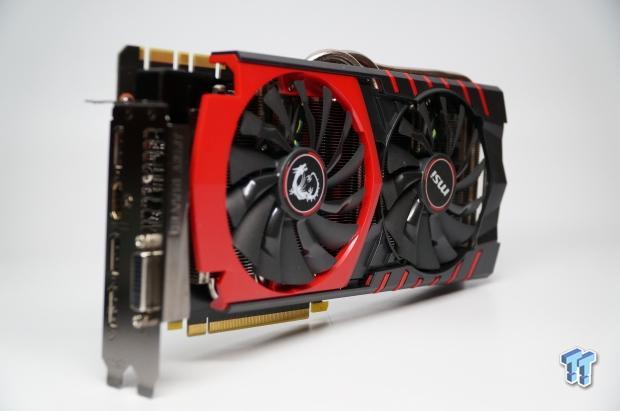
This type of performance, for the price, is great. Just a couple of years ago, we would've killed for 4K 60FPS gaming from a single card, but even then most cards were pulling down 300W. MSI has provided a card with factory overclocks that is using just 230W, and 260W with an extreme overclock and another 10-20% performance.
The card doesn't even make a sound when playing games, which is another testament to the great Twin Frozr V cooler on the GTX 980 Gaming 4G LE. Right now, any of MSI's cards with the Twin Frozr V are going to be virtually the same, especially when they're powered by NVIDIA's Maxwell architecture - which doesn't require too much power, and it runs nice and cool.
If you're in the market for an overclocked GeForce GTX 980, you should definitely consider what MSI has on offer with the GTX 980 Gaming 4G LE. From the package right down to the card, acoustics, and performance, MSI has it in the bag. Nothing but class from MSI.

